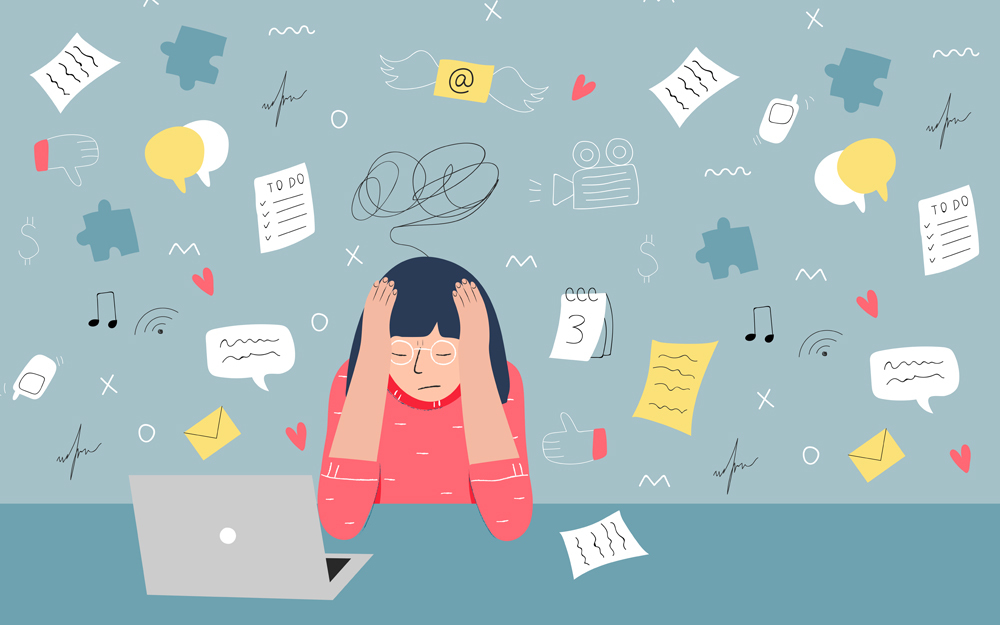With frequent stressors often taking control of our daily lives, it can be easy to feel overwhelmed by the burden of constant tasks and responsibilities. Having positive ways to manage everyday stress is key to developing a healthy mindset for the long-term. One of the most important aspects of stress management is to reduce its impact on the body and mind, helping to avoid feeling overpowered by anxiety. Being in control of one’s life is all about controlling emotions and thoughts, and having the necessary tools to manage stress can only help to do so.
The term “stress” refers to any type of physical, emotional or psychological strain caused by a change. When faced with something that requires attention or action, the body reacts with stress.
There is always some degree of stress in everyone’s life – it’s inevitable. Being a student athlete is one of the ways that high schoolers often experience stress. For instance, every weekday after school, freshman Sophie Simons swims for two hours for Naples High’s swim team. She sets timers and reminders on her phone to keep herself on time and on track, as well as to remind her to do her homework.
“Sometimes I feel overwhelmed, stressed and unmotivated, but I remember I’m doing this for a better future, so I do what I have to do,” Simons said.
According to medical reviewer Kathleen Smith, PhD, LPC at Psycom.net, “the most common sources of stress for teens are school (83%), getting into a good college (69%) and financial concerns for their families (65%).”
One of the many determining factors of being accepted into a college are good grades, which can only be achieved through effective time management. It only takes one small event to throw any well-laid schedule out of whack, but talking to others when under a lot of stress can offer helpful advice and support.
Organizing, setting timers, not procrastinating and not being too hard on herself when she finds that she is having difficulty with task management is how AP Human Geography teacher Kelly Romero-Bettridge best deals with stress.
“My advice to students would be to try and use perspective to change their mindset about the things in life that may be causing them stress,” Bettridge said.
Many of the things that cause stress, especially when younger, will seem much less important after some time passes.
“I would ask a student to think about a time in the past that they experienced this, and then ask them to refer to a past experience when they feel that whatever they are facing seems too much to manage,” Bettridge said. “They can probably learn from their own experiences that they have been able to handle very stressful situations.”
Here are 15 easy and effective ways to reduce stress to bounce back quickly and keep stress levels low:
- Breathe. Stress can be reduced with breathing exercises once an hour. There is a breathing app available on Apple and most smart phones. Relaxation is controlled by the parasympathetic nervous system, which is activated by deep breathing. As we breathe more slowly and deeply, we become more relaxed.
2. Find quiet. Sit in a quiet room or outside away from any noise. Put on some noise canceling headphones. Getting away from the noise of TV, radio, podcasts, the sounds of work and conversation or traffic rests the brain and relieves tension.
3. Music. Physiological processes in the body can be slowed down by soothing music. According to studies, those who are anxious will feel less stressed when listening to music. Moreover, music has been associated with easing sadness, lessening burnout and elevating mood. The same is true for creating music, as research suggests that doing so could aid in releasing negative feelings, reducing anxiety and enhancing general mental wellness.
4. Walk. Even a short 10-minute stroll inside can enhance blood flow and cardiovascular activity, relieving stress. Even better is taking a stroll outside, where nature and the change in scenery will momentarily cause distraction from difficult emotions or negative thoughts. When at home, walking the dog is also beneficial, considering that pets are also another way to reduce stress.
5. Dark chocolate. It is antioxidant-rich and reduces stress by lowering certain hormones in the body. One or two ounces that contain at least 65% cacao can also lower blood pressure and cholesterol.
6. Rest. Most adults require seven and a half to eight hours of sleep on a daily average to stay mentally healthy. Lack of sleep is an immediate cause of stress and can exacerbate other daily stressors. If not enough sleep is received at night, consider taking a 30 to 40-minute nap. If short on time, have a quick lunch in 20 minutes and then enjoy the remaining 20 minutes to relax.
7. Reduce caffeine. It can increase alertness, but caffeine is also known to increase anxiety, cause jittery behavior, reduce restful sleep, increase digestive issues and raise blood pressure. Simply put, caffeine and stress go hand in hand.
8. Read a book. The mind enjoys creating images of places, circumstances and people that are the natural result of journeying into a literary world. The mind enjoys mental excursions from fiction, non-fiction and even an interesting magazine.
9. Schedule your time. A person gets stressed when they think they don’t have enough time to carry out responsibilities. Having a realistic schedule for the day may be a terrific stress reducer. Scheduling time also makes it easier to identify what can be accomplished or given priority, giving greater control over tasks.
10. Draw a picture. The mind can be easily distracted by drawing and coloring. It benefits from a quality of thought called “flow”, which is when one is so fully immersed in something that it is almost meditative. This calming and mind-consuming mentality is experienced in hobbies like sketching, gardening and hiking. Adult coloring books have grown to be highly popular, and many of the intricate patterns need preparation and thinking to finish.
11. Citrus. Stress can be reduced by the vitamin C in oranges, strawberries and grapefruit. Red and green peppers, kiwifruit, baked potatoes, tomatoes and broccoli are other foods high in vitamin C.
12. Daydream. Close your eyes and mentally escape a difficult circumstance. Daydreaming can involve reliving a great experience and creating new ideas to help the mind unwind. It may “turn off” the analytical, judgment-making portion of your brain, which liberates the mind to engage in creative activities.
13. Dietary supplements.The anti-anxiety benefits of green tea, kava, valerian root and lemon balm are well-documented. The goal of these meals and supplements is to change the GABA receptors and raise serotonin levels, which has the advantage of reducing stress and anxiety. B-complex vitamins may also be beneficial.
14. Family time. Being among friends and family can give a sense of belonging and self-worth during stressful times.
15. Unplug. Research shows a person can spend up to 16 hours a day in front of their various screens. This constant availability and connectedness can be quite stressful. Unplug for a certain number of hours per day. Use the phone’s “screen time” feature to limit interruptions during personal hours. Go a step further and schedule a media detox—a cell phone-free weekend or skip social media for a day and TV for an evening.






